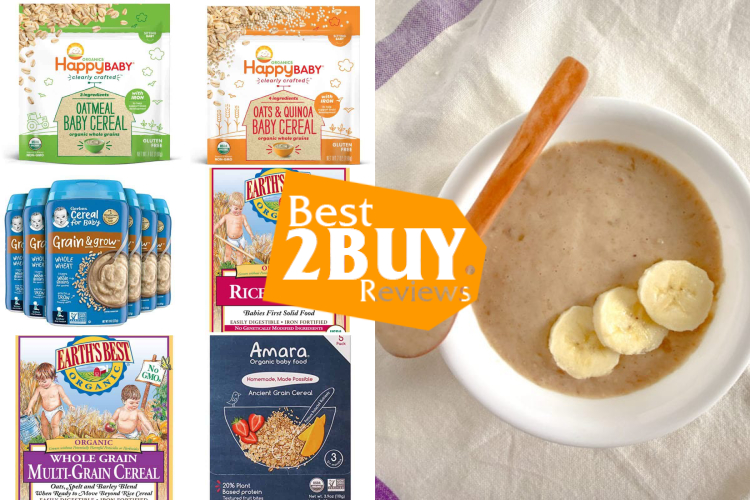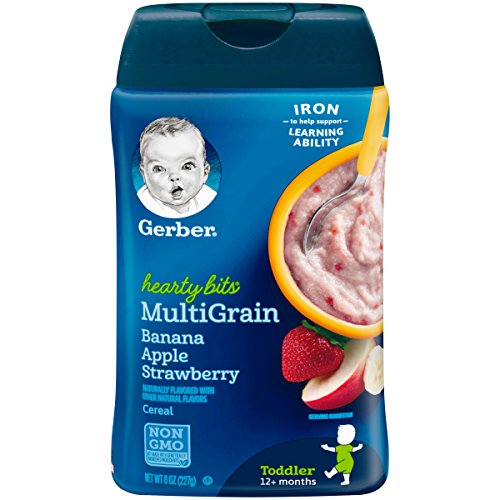How to Choose the Baby Cereal
The ABCs of Baby Cereal: A Guide to Nutrient-Packed Starters

- 1. The ABCs of Baby Cereal: A Guide to Nutrient-Packed Starters
- 1.1. When to Introduce Baby Cereal
- 1.2. Benefits of Baby Cereal
- 1.3. Types Of Baby Cereal
- 1.3.1. Rice Cereal
- 1.3.2. Oatmeal Cereal
- 1.3.3. Barley Cereal
- 1.3.4. Multigrain Cereal
- 1.3.5. Quinoa Cereal
- 1.3.6. Wheat Cereal
- 1.4. Choosing the Right Baby Cereal
- 1.4.1. Age Appropriateness
- 1.4.2. Nutritional Content
- 1.4.3. Single-Grain vs. Multigrain
- 1.4.4. Ingredients
- 1.4.5. Allergen Considerations
- 1.4.6. Texture and Consistency
- 1.4.7. Organic Options
- 1.4.8. Fortification
- 1.4.9. Ease of Digestion
- 1.4.10. Taste and Acceptance
- 1.5. How to Introduce Baby Cereal
- 1.6. Common Concerns and Tips
- 1.7. Conclusion
Introducing solid foods to an infant marks a notable milestone in their growth, and the selection of appropriate initial foods holds paramount importance. Many parents opt for baby cereal as an initial step in transitioning to solid foods. Baby cereal is favored for its nutritional richness, facilitating a seamless shift from a liquid diet to more solid textures. This piece delves into the advantages of incorporating baby cereal, guidelines on when to initiate this transition, methods for selecting the appropriate variant, and insights for a smooth and successful introduction.
When to Introduce Baby Cereal
Pediatricians frequently advise introducing solid foods to infants at approximately six months of age. By this point, most infants have acquired the essential motor skills needed to consume foods with varied textures. It is crucial to observe signs of readiness, including the ability to sit up with support, displaying interest in food, and demonstrating good head control.
Benefits of Baby Cereal
Baby cereals, usually made from iron-fortified grains like rice, oatmeal, or barley, offer numerous benefits for a growing infant:
- Nutrient-Rich: Baby cereals are often fortified with essential nutrients such as iron, which is crucial for healthy brain development.
- Texture Introduction: The smooth texture of baby cereal helps babies transition from the smoothness of breast milk or formula to the more textured world of solid foods.
- Digestive Health: Cereals, especially those containing whole grains, can aid in promoting healthy digestion and regulating bowel movements.
- Customizable Nutrition: Mixing baby cereal with breast milk or formula allows parents to control the consistency and nutrient content, ensuring a gradual transition to solid foods.
Types Of Baby Cereal
Baby cereals are a popular first food for infants as they are easy to digest and often fortified with essential nutrients. Here are some common types of baby cereals:
Rice Cereal
Among the first solid foods introduced to infants, rice cereal stands out as a common choice. Praised for its mild flavor and easy digestibility, rice cereal serves as a gentle initiation into the world of solid foods. It provides a smooth transition for babies as they explore new textures and tastes in their early stages of weaning.
Oatmeal Cereal
Oatmeal cereal presents another popular option for introducing babies to solid foods. Recognized for its heartier texture compared to rice cereal, oatmeal also offers a substantial source of fiber. This additional fiber content supports healthy digestion and lays the foundation for a balanced diet as infants grow.
Barley Cereal
Although less common, barley cereal emerges as a nutritious choice for infant nutrition. Packed with fiber, vitamins, and minerals, barley cereal contributes to the overall health of the baby. Its unique nutrient profile adds diversity to the infant's diet, promoting a well-rounded and wholesome approach to early nutrition.
Multigrain Cereal
For parents seeking a blend of nutritional benefits, multigrain cereals come to the forefront. These cereals, crafted from a mix of grains such as rice, oats, and barley, offer a diverse array of nutrients. The combination provides infants with a well-rounded nutritional experience, supporting their growth and development.
Quinoa Cereal
Quinoa, a grain rich in protein and essential nutrients, takes its place in the realm of baby cereals. As a wholesome choice, quinoa cereals contribute to the introduction of diverse nutrients to infants. The protein content aids in the development of growing muscles and tissues, making it a valuable addition to the infant's diet.
Wheat Cereal
Wheat-based cereals mark a significant milestone in a baby's nutritional journey, typically introduced around 6 months of age when infants start to tolerate gluten. Beyond providing additional nutrients and energy, wheat cereals support the gradual exposure of the infant to gluten, a vital step in the developmental process.
Choosing the Right Baby Cereal
Choosing the right baby cereal is an important decision as it plays a crucial role in your baby's early nutrition. Here are some factors to consider when selecting baby cereal:
Age Appropriateness
Selecting a baby cereal appropriate for your child's age and developmental stage is crucial. Some cereals are specially formulated for infants, offering a smooth transition into solid foods. As your baby grows, you may transition to cereals designed for older infants with more advanced nutritional needs.
Nutritional Content
Look for baby cereals that are fortified with essential nutrients such as iron, zinc, calcium, and vitamins. These nutrients play a vital role in supporting your baby's rapid growth and development during the early months and years of life.
Single-Grain vs. Multigrain
When introducing solids, single-grain cereals like rice or oatmeal are often recommended as a gentle starting point. As your baby becomes accustomed to solids, you can gradually incorporate multigrain cereals to provide a diverse range of nutrients.
Ingredients
Examine the ingredient list carefully, avoiding cereals with excessive additives, preservatives, or artificial colors. Opt for baby cereals with minimal and wholesome ingredients to ensure that your baby gets nutrition without unnecessary additives.
Allergen Considerations
Be mindful of potential allergens such as wheat, dairy, and nuts. If there is a family history of food allergies, consider introducing single-ingredient cereals initially. Monitor your baby closely for any adverse reactions, and consult with a pediatrician if you have concerns.
Texture and Consistency
Consider your baby's readiness for different textures. Some babies may prefer smoother textures, while others may be ready for a bit more texture in their cereals. Pay attention to your baby's cues and adjust the texture accordingly.
Organic Options
For parents concerned about pesticides and additives, organic baby cereals are a viable option. These cereals are produced without synthetic pesticides and fertilizers, providing a more natural and wholesome choice.
Fortification
Check if the cereal is fortified with essential nutrients, with special emphasis on iron. Iron-fortified cereals are vital as babies' natural iron stores deplete, and ensuring an adequate iron intake is crucial for their overall health.
Ease of Digestion
Opt for cereals that are easy for your baby to digest. Some babies may be sensitive to certain grains, so it's essential to observe how your baby reacts to different cereals and make adjustments as needed.
Taste and Acceptance
Babies, like adults, have preferences for taste and texture. Experiment with different cereals to find the one your baby enjoys the most. Pay attention to their reactions and be patient as they develop their palate.
How to Introduce Baby Cereal
- Start Slow: Begin with a small amount of cereal mixed with breast milk or formula to create a smooth consistency.
- Consistency Matters: Gradually increase the thickness of the cereal as the baby becomes more accustomed to the texture.
- Timing Matters: Introduce baby cereal during a time when your baby is calm and not too hungry to ensure a positive experience.
- Stay Patient: Some babies may take time to adjust to the new texture and taste, so be patient and try again if they initially reject it.
Common Concerns and Tips
- Choking Hazard: Always ensure that the consistency of the cereal is appropriate for your baby's age to minimize the risk of choking.
- Allergic Reactions: Monitor your baby for any signs of allergic reactions, and consult with a healthcare professional if you have concerns.
- Individual Preferences: Every baby is unique, and preferences can vary. Experiment with different cereals to find the one your baby enjoys the most.
Conclusion
Introducing baby cereal is a thrilling moment that signifies the start of a baby's venture into the realm of solid foods. By attentively assessing your baby's developmental readiness and choosing cereals rich in nutrients, this transition can be a beneficial and gratifying journey for both parents and infants. It's essential to seek guidance from your pediatrician to ensure your choices align with your baby's individual needs and health prerequisites.










